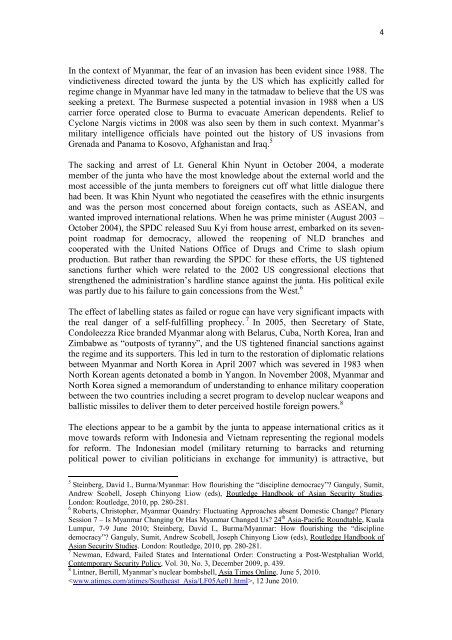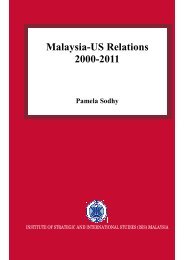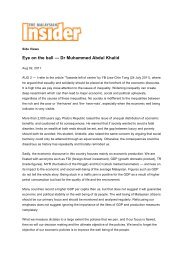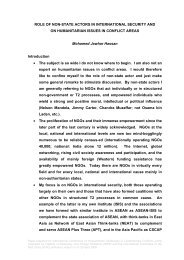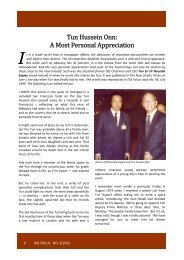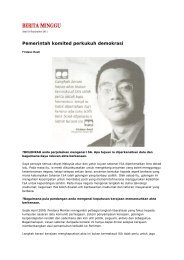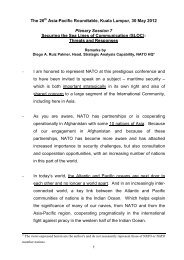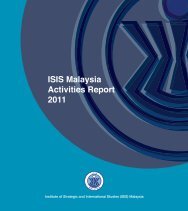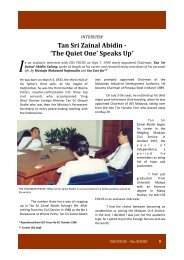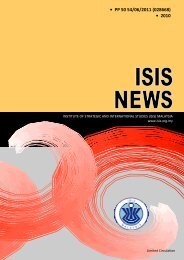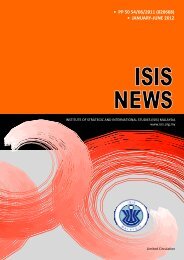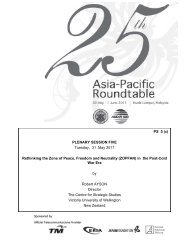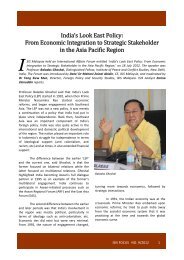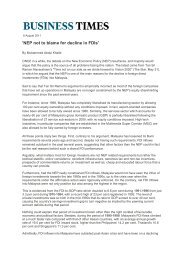Soft Power of Defence Diplomacy: A New Approach ... - ISIS Malaysia
Soft Power of Defence Diplomacy: A New Approach ... - ISIS Malaysia
Soft Power of Defence Diplomacy: A New Approach ... - ISIS Malaysia
Create successful ePaper yourself
Turn your PDF publications into a flip-book with our unique Google optimized e-Paper software.
4In the context <strong>of</strong> Myanmar, the fear <strong>of</strong> an invasion has been evident since 1988. Thevindictiveness directed toward the junta by the US which has explicitly called forregime change in Myanmar have led many in the tatmadaw to believe that the US wasseeking a pretext. The Burmese suspected a potential invasion in 1988 when a UScarrier force operated close to Burma to evacuate American dependents. Relief toCyclone Nargis victims in 2008 was also seen by them in such context. Myanmar’smilitary intelligence <strong>of</strong>ficials have pointed out the history <strong>of</strong> US invasions fromGrenada and Panama to Kosovo, Afghanistan and Iraq. 5The sacking and arrest <strong>of</strong> Lt. General Khin Nyunt in October 2004, a moderatemember <strong>of</strong> the junta who have the most knowledge about the external world and themost accessible <strong>of</strong> the junta members to foreigners cut <strong>of</strong>f what little dialogue therehad been. It was Khin Nyunt who negotiated the ceasefires with the ethnic insurgentsand was the person most concerned about foreign contacts, such as ASEAN, andwanted improved international relations. When he was prime minister (August 2003 –October 2004), the SPDC released Suu Kyi from house arrest, embarked on its sevenpointroadmap for democracy, allowed the reopening <strong>of</strong> NLD branches andcooperated with the United Nations Office <strong>of</strong> Drugs and Crime to slash opiumproduction. But rather than rewarding the SPDC for these efforts, the US tightenedsanctions further which were related to the 2002 US congressional elections thatstrengthened the administration’s hardline stance against the junta. His political exilewas partly due to his failure to gain concessions from the West. 6The effect <strong>of</strong> labelling states as failed or rogue can have very significant impacts withthe real danger <strong>of</strong> a self-fulfilling prophecy. 7 In 2005, then Secretary <strong>of</strong> State,Condoleezza Rice branded Myanmar along with Belarus, Cuba, North Korea, Iran andZimbabwe as “outposts <strong>of</strong> tyranny”, and the US tightened financial sanctions againstthe regime and its supporters. This led in turn to the restoration <strong>of</strong> diplomatic relationsbetween Myanmar and North Korea in April 2007 which was severed in 1983 whenNorth Korean agents detonated a bomb in Yangon. In November 2008, Myanmar andNorth Korea signed a memorandum <strong>of</strong> understanding to enhance military cooperationbetween the two countries including a secret program to develop nuclear weapons andballistic missiles to deliver them to deter perceived hostile foreign powers. 8The elections appear to be a gambit by the junta to appease international critics as itmove towards reform with Indonesia and Vietnam representing the regional modelsfor reform. The Indonesian model (military returning to barracks and returningpolitical power to civilian politicians in exchange for immunity) is attractive, but5 Steinberg, David I., Burma/Myanmar: How flourishing the “discipline democracy”? Ganguly, Sumit,Andrew Scobell, Joseph Chinyong Liow (eds), Routledge Handbook <strong>of</strong> Asian Security Studies.London: Routledge, 2010, pp. 280-281.6 Roberts, Christopher, Myanmar Quandry: Fluctuating <strong>Approach</strong>es absent Domestic Change? PlenarySession 7 – Is Myanmar Changing Or Has Myanmar Changed Us? 24 th Asia-Pacific Roundtable, KualaLumpur, 7-9 June 2010; Steinberg, David I., Burma/Myanmar: How flourishing the “disciplinedemocracy”? Ganguly, Sumit, Andrew Scobell, Joseph Chinyong Liow (eds), Routledge Handbook <strong>of</strong>Asian Security Studies. London: Routledge, 2010, pp. 280-281.7 <strong>New</strong>man, Edward, Failed States and International Order: Constructing a Post-Westphalian World,Contemporary Security Policy, Vol. 30, No. 3, December 2009, p. 439.8 Lintner, Bertill, Myanmar’s nuclear bombshell, Asia Times Online, June 5, 2010., 12 June 2010.


